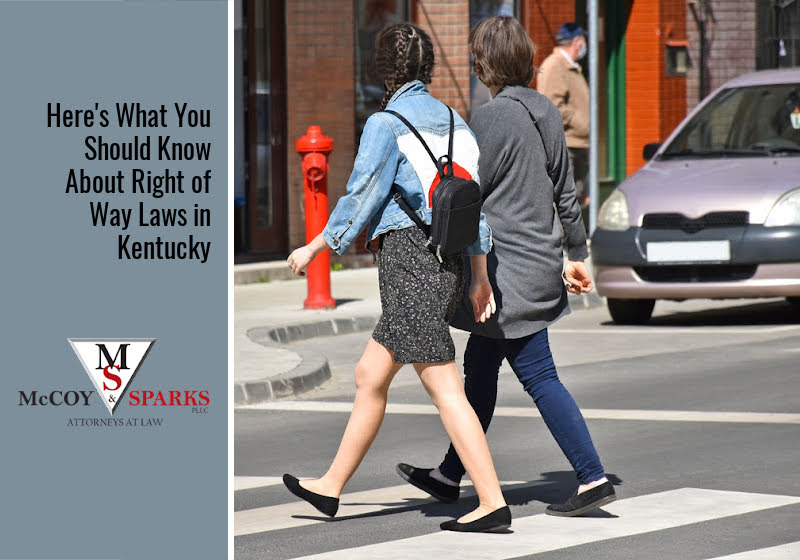
All states, including Kentucky, have laws in place concerning right-of-way. Though most drivers pick up on basic right-of-way behaviors and practices from the moment they begin learning to drive, many often forget the rules over time or become lazy and ignore them. In some cases, many drivers will even think they know what the right-of-way law is in a certain situation, only to find out they were wrong.
Unfortunately, disobeying right-of-way laws, whether on purpose or by accident, can result in severe collisions and injuries. These accidents can be even more devastating when it involves a pedestrian or a bicyclist. This is why it is crucial for Kentucky drivers to fully understand how the state’s right-of-way laws work.
If you or a loved one are injured in a right-of-way accident or have questions about fault, contact your local Kentucky car accident lawyers. At McCoy & Sparks, we have experience handling numerous right-of-way accident cases and are dedicated to helping our clients seek justice and get the compensation they deserve.
What Happens When a Driver Fails to Yield the Right-of-Way in Kentucky?
In any situation, failing to yield the right-of-way can have disastrous results. So it is wise to take precautions and follow the law no matter the circumstances. The penalties for failing to yield the right-of-way can vary, however, depending on the circumstances.
Failing to yield to a vehicle passing from the opposite direction or general failure to yield the right-of-way can result in a $20 – $100 fine, $143 in court fees, 3 points on your license, and a general violation noted on your record.
Failing to yield to a funeral procession can result in a $250 fine, $143 in court fees, 3 points assessed on your license, and a Class B Misdemeanor noted on your record, resulting in up to 90 days in jail.
Failing to yield to an emergency vehicle can result in a $60 – $500 fine, $143 in court fees, 4 points on your license, a Class B Misdemeanor, and up to 30 days in jail.
Kentucky Legislation on Yielding the Right-of-Way
In the most basic sense, Kentucky right-of-way laws require drivers to stop and allow another person or vehicle to make their move first. However, the specifics can vary depending on the situation or who/what kind of vehicle is involved.
Intersection Right-of-Way Laws
- If two vehicles approach an intersection at the same time, the vehicle on the left must yield to the vehicle on the right.
- Drivers must obey right-of-way in accordance with stop signs, yield signs, traffic lights, etc., except when instructed to do otherwise by law enforcement.
- If there is no sign or light indicating a stop or yield must be made, a driver must yield to other vehicles already in the intersection or oncoming vehicles so close to being in the intersection that it could cause a hazard if the driver were to enter the intersection as well.
- A driver intending to turn left at an intersection or onto a private road or driveway must yield to vehicles approaching from the opposite direction.
- When a driver intends to enter or cross a roadway at a point other than an intersection, they must yield to oncoming vehicles already in the roadway.
- At a roundabout, all drivers must yield before entering to vehicles already in the roundabout.
Special Vehicle Right-of-Way Laws
Kentucky has two laws concerning specialty vehicles:
- The Slow Down to Get Around law requires drivers to slow down, stop, and yield to waste collection vehicles.
- The Move Over law requires drivers to move over, stop, and yield to moving and even parked emergency vehicles. When an emergency vehicle is approaching, drivers must move to the right to create a clear path and stop. When an emergency vehicle with flashing lights is parked, drivers must change lanes if possible to allow for an empty lane between them and the parked emergency vehicle.
Pedestrian Right-of-Way Laws
- Drivers must yield to pedestrians in crosswalks at any place on the road and unmarked crosswalks at intersections.
- Drivers may not pass other vehicles that are stopped to allow for a pedestrian to cross the road.
- If a pedestrian is entering the road at any other point other than a crosswalk or intersection, THEY must yield the right-of-way to all oncoming vehicles.
Bicycle Right-of-Way Laws
- Bicyclists must generally operate similar to motor vehicles in the roadway, obeying traffic right-of-way laws.
- A bicycle may, however, operate on the shoulder unless prohibited or in a designated bike lane.
- Drivers must share the road with bicyclists.
- Drivers may not turn in front of a bicyclist if they have the right of way to continue in their path or are themselves making a turn at an intersection.
Trust McCoy & Sparks—Premier Personal Injury Attorneys in Central Kentucky
If you are involved in a right-of-way accident and have questions or concerns about who was at fault or need help filing a claim, our team of experienced Kentucky accident attorneys can assist you.
Recognized as one of Central Kentucky’s best law firms, McCoy & Sparks represents thousands of clients in Central Kentucky with a focus on providing premium service. Our goal is to help you reach the best possible result.
You owe us nothing unless we recover compensation for you. Make the right call to (844) 4KY-WINS for a risk-free consultation with one of our attorneys today.

